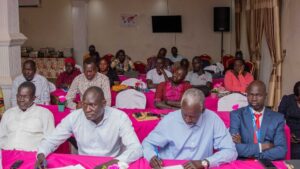By James Luala
In the heart of South Sudan, where the church is not only a spiritual beacon but also a pillar of communal strength, an unprecedented transformation is taking root – the advent of digital banking.
As the Head of International Development Groups at Stanbic Bank, I had the honour of participating in an enlightening training event with World Vision South Sudan, where participants from diverse church denominations, government representatives, and faith-based organisations gathered to explore the transformative potential of digital finance.
Facilitated by World Vision’s Angelo Mathuch, Faith and Development Interim Area Program Manager, this event brought together voices from different corners of the country, united in their commitment to leveraging technology for the common good. The training focused on the intersection of faith and finance in the digital age. The discussion centred on how digital banking can be a lever for economic growth and social progress, particularly in a nation where the majority embrace Christian values that underscore communal development and ethical stewardship.

Digital banking, simply put, is the seamless integration of banking services into the digital realm, enabling transactions, savings, credit, and financial literacy to be just a click away. This innovation is more than a convenience; it is a transformative force, particularly in regions like South Sudan, where traditional banking infrastructure is sparse, yet mobile penetration is rising. With its extensive influence and network, the church can play a pivotal role in advocating for and guiding the adoption of digital financial services, thus fostering inclusive economic growth.
The advantages of digital banking are manifold. It tears down geographical barriers, allowing individuals in the most remote villages to connect to the global economy. It offers unprecedented convenience and efficiency in transactions, cutting down on time spent travelling to and queuing in banks. Moreover, digital records and transactions provide transparency and accountability, which are essential for economic development.
However, we must acknowledge that the path to digital enlightenment is challenging. Cybersecurity threats, digital illiteracy, and the digital divide are significant concerns that could hinder the uptake and effectiveness of digital banking services. A population largely unbanked or unfamiliar with digital tools requires a careful and considerate introduction to this new era.
At Stanbic Bank, we are mindful of these challenges. We are committed to instituting robust cybersecurity measures, investing in digital literacy initiatives, and ensuring our digital platforms are intuitive and accessible. We are embracing technology as the “new gold mine” and responsibly stewarding the transition to ensure that no member of our community is left behind.
The church’s extensive network and moral authority provide a unique platform to disseminate knowledge and foster trust in digital banking services. As a majority Christian nation, the values of honesty, trustworthiness, and caring for one’s neighbour are woven into the fabric of our society. These values align perfectly with the ethos of Stanbic Bank and can be the guiding light in our journey through the digital landscape.
As we navigate towards a digital future, let us not forget the values that bind us – integrity, community, and service. Stanbic Bank is leading the charge in driving digital financial inclusion. We are forging alliances that acknowledge the potential of digital banking to revolutionize lives and empower individuals. Our dedication to South Sudan is resolute, and we are committed to harnessing the power of technology to construct a more prosperous, inclusive, and resilient nation.
Head, IDG Sector, Stanbic Bank South Sudan



